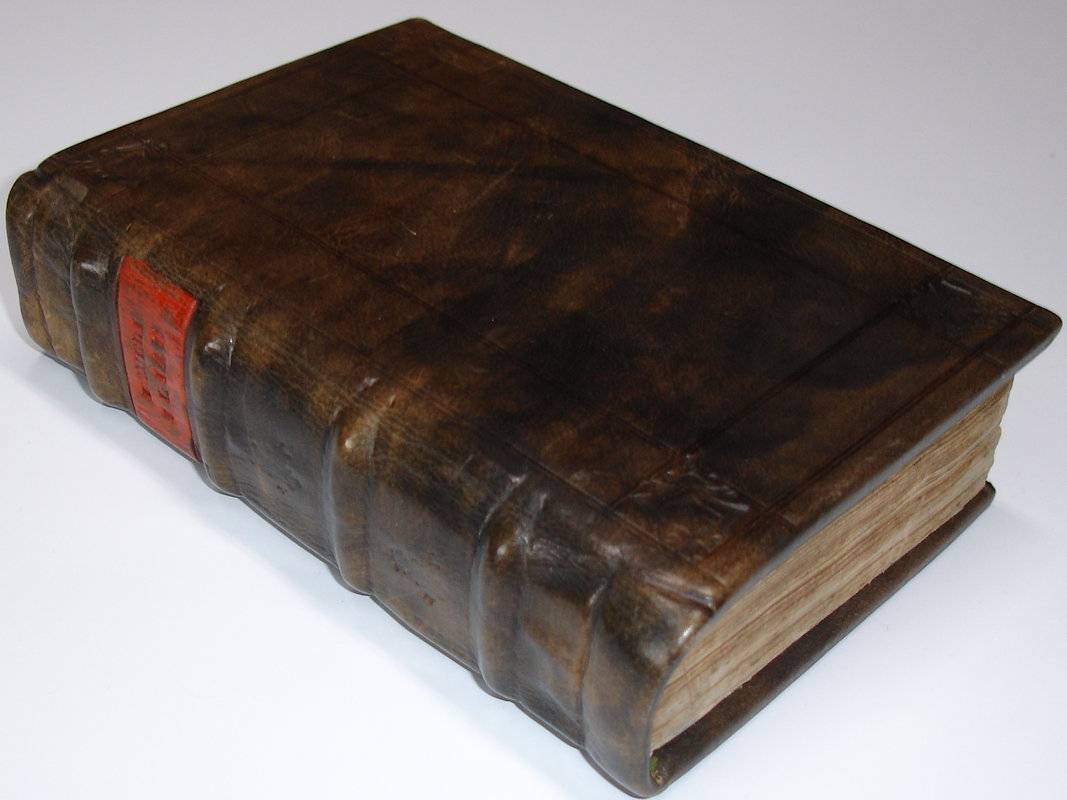HOMERUS.
Homeri poetae clariss. Ilias. Interprete Lauren. Valla.
N.pl. (Cologne), Eucharius Cervicornus excudebat, 1527.
495,(1 woodcut),32 (index) p. 20th century calf 16 cm (
Ref: VD16 H 4663; Hoffmann 2,334; Not in Brunet, Graesse, Ebert & Moss) (
Details: Very tasteful new binding in antique 16th century style, with 4 raised bands on the back, and a red shield in the second compartment. Title with woodcut borders, depicting in the lower part the adoration of Christ by the three Magi; the text of the title is flanked by 2 pillars; on the upper part two winged putti that flank a coat of arms; on the shield of it a kind of thornbush (thorns - antlers?); above the shield are the three crowns of the arms of the city Cologne. The woodcut at the end of the Ilias depicts Saint George killing the dragon) (
Condition: The title is slightly soiled and its right margin and that of the last leaf are thumbed. A tiny and almost invisible hole in the title) (
Note: 'Despite the faltering knowledge of Greek in the early Middle Ages, stories of the battle of Troy and the wanderings of Odysseus never lost their appeal in the European imagination. Christian intellectuals read and reread these tales in late antique Latin paraphrases that communicated most of the content but little of the poetic virtuosity of Homer's Iliad and Odyssey. Some, like the Ilias latina, which condensed Homer's poem into 1070 lines of Latin hexameter, were crude distillations of long familiar stories. Others, like the 'Ephemeris belli Troiani' of Dictys Cretensis and the 'Historia de excidio Troiae' of Dares Phrygius, were presented as Latin translations of lost Greek accounts of the fall of Troy allegedly composed by individuals who had taken part in the battle. In the absence of the Greek originals, these Latin texts mediated the tale of Troy's fall to medieval readers for almost a millenium. (...) It was only in the 14th century that early humanists sought out Homer's poems in Greek and rendered them into Latin for a learned audience eager to devour the poet's words, even if they were mediated in another language. By the end of the 15th century, 17 Latin translations of the works of Homer had appeared. (G.S. Scott's review of B. Schneider and Chr. Meckelnborg, 'Odyssea Homeri a Francisco Griffolino Aretino in Latinum translata' in 'The Medieval Review' of 13-03-06) The most influential one was the prose translation of The Italian humanist Lorenzo Valla, latinized as Laurentius Valla, 1407-1457, famous student of the humanist scholar Giovanni Aurispa, promoter of the revival of Greek studies in Renaissance Italy. In 1450 Valla was appointed professor of Rhetoric in Rome. He is one of the founders of historical criticism. On the basis of textual analysis he proved that the so-called 'Donation of Constantine' in the decree of Gratian, was a forgery, being an interpolated passage. 'In the domain of pure scholarship Valla's reputation mainly rests on his widely diffused work 'On the Elegancies of the Latin language', the result of many years of labour. He here attacks the barbarous Latin of the Middle Ages and of his own times.' (Sandys, 2,68) As a Greek scholar Valla translated Thucydides, Herodotus, and the 'De Corona' of Demosthenes. In the service of the king of Naples he translated between 1442 and 1444 the first 16 books of the Ilias of Homer. This translation, left incomplete, was completed by Valla's pupil Francesco Griffolini sometime before 1461, and was first published in 1474) (
Provenance: On the front pastedown a small bookseller's label: 'Matthäus Truppe, Buchhandlung u. Antiquariat, Graz, Stubenberggasse 7') (
Collation: A-2H8, 2a-2b8, woodcut on 2H8 verso) (Photographs on request)
Book number: 120257 Euro 1200.00
Keywords: (Oude Druk), (Rare Books), Greek literature, Griechische Literatur, Homer, Homerus, Iliad, Ilias, Lorenzo Valla, Valla, antike altertum antiquity
 HOMERUS.
HOMERUS.